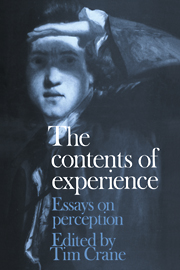Book contents
- Frontmatter
- Contents
- Preface
- Notes on contributors
- 1 Introduction
- 2 The puzzle of experience
- 3 How to interpret ‘direct perception’
- 4 Experience and its objects
- 5 Scenarios, concepts and perception
- 6 The nonconceptual content of experience
- 7 Visual qualia and visual content
- 8 The projective theory of sensory content
- 9 Sight and touch
- 10 The diversity and unity of action and perception
- References
- Index
7 - Visual qualia and visual content
Published online by Cambridge University Press: 22 September 2009
- Frontmatter
- Contents
- Preface
- Notes on contributors
- 1 Introduction
- 2 The puzzle of experience
- 3 How to interpret ‘direct perception’
- 4 Experience and its objects
- 5 Scenarios, concepts and perception
- 6 The nonconceptual content of experience
- 7 Visual qualia and visual content
- 8 The projective theory of sensory content
- 9 Sight and touch
- 10 The diversity and unity of action and perception
- References
- Index
Summary
Many philosophers take it to be evident that visual experiences have, over and above their representational contents, intrinsic, introspectively accessible properties in virtue of which they have those contents. Such properties, which are held to ground the subjective character or phenomenal ‘feel’ of the experiences, I shall call ‘visual qualia’. Many an argument there has been about whether qualia, visual and otherwise, can be accommodated within a physicalist view of the mental or whether they are special, irreducible properties. I have come to think that at least as far as visual experience is concerned these arguments are badly misguided. I now believe that there are no visual qualia. So the question as to whether they are physical or irreducible simply does not arise.
This position will undoubtedly strike those (including my erstwhile self: Tye 1986; Tye 1989, chapter 6) who have engaged in debate about the nature of qualia as puzzling indeed. Isn't it just obvious from introspection that there are visual qualia? Surely the only real question, many will say, concerns the status of such qualia. Challenges to their existence are no more worthy of serious consideration than challenges to the existence of tables and chairs. In what follows, I shall try to show not only that no good reasons have been adduced for believing in visual qualia but also that, upon proper reflection, the most natural view is that there are none.
The paper is divided into three sections.
- Type
- Chapter
- Information
- The Contents of ExperienceEssays on Perception, pp. 158 - 176Publisher: Cambridge University PressPrint publication year: 1992
- 38
- Cited by



